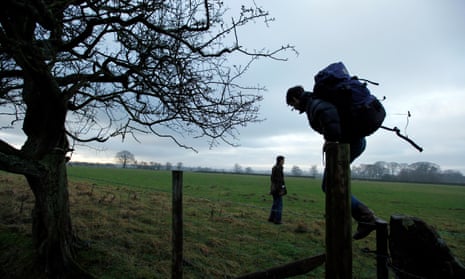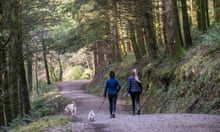People have no right to roam at all in 92 constituencies across England, new data shows, as campaigners call for an outdoor access code to link people to nature.
Next week, MPs will debate the “right to roam”, namely the ability to legally and responsibly walk through the countryside, leaving no trace behind. Currently, just 8% of England has this designation, which covers coastal paths, mountains and moorland.
Data compiled by the environmental campaigner Guy Shrubsole and the Right to Roam campaign has ranked the constituencies with the most – and least – free access in their area.
Conservative constituencies tended to have more free access than Labour ones. The constituency of the prime minister, Rishi Sunak, Richmond in Yorkshire, ranks fourth out of the 533 English seats in terms of the area of land you can freely roam over. The constituency of the Labour leader, Keir Starmer, Holborn and St Pancras, ranks 321st.
Of the 100 constituencies with most access, 91 are Tory, seven Labour and two Lib Dem. Of the 100 constituencies with least access, 70 are Labour, 29 are Tory, with one Lib Dem.
Penrith and the Border, a Conservative constituency held by Neil Hudson, has the widest right to roam, with 111,370 hectares (275,201 acres) available. This is followed by Hexham, held by his fellow Tory Guy Opperman, with 97,495 hectares (240,915 acres), and then Tory MP Julian Smith’s constituency of Skipton and Ripon, with 76,028 hectares (187,869 acres).
There are 117 constituencies in England with less than one hectare of land where the public have a right to roam.
Caroline Lucas, the Green MP for Brighton Pavilion, is calling for free access across woodlands and the green belt, which would free up land for walks in the countryside around urban areas, which are less likely to have areas with the right to roam in them.
She said: “Our immersion in nature and intimate connection to it is vital if we’re going to inspire people to know it, love it and therefore protect it. Yet this data reveals that not only a tiny proportion of English land and rivers are legally accessible to the public – but also that small amount of access is very unequally distributed across the country.
“Increased and more equal public access to nature has so many benefits – to our economy, to our physical and mental health, and to our ability to tackle the climate and nature emergencies. The time has come for an extended right to roam in England – and I’m urging the government to adopt it.”
Access to nature is unequally distributed across England. Seventy-two per cent of the Peak District is access land, compared with just 0.6% of Kent. Until recently, Dartmoor was the only place in England and Wales where the public had a right to wild camp – but in January that right was extinguished after a court case brought by a local landowner.
Campaigners are calling for something more wide-ranging than Lucas’s right to roam bill; they point out that there has been a successful approach modelled by Scotland for the past 20 years. This established public rights of responsible access to most land and water in Scotland, subject to a set of exceptions – such as private dwellings and gardens, school playing fields, military and construction sites, and land on which crops are growing. Its provisions include a broad range of recreational activities, from walking to cycling, camping, swimming and horse riding.
after newsletter promotion
Shrubsole said: “The public’s right to access nature in England is hugely unequal. Not only does our right to roam cover just 8% of the country, much of this is remote from where most people live; there are 92 constituencies in England with no right to roam at all.
“The best way to solve this is for England to follow Scotland’s lead, and legislate for a new right of responsible access covering the majority of land and water – with sensible exceptions like private gardens and land on which crops are growing, and seasonal restrictions for sensitive nature sites.
“A new Right to Roam Act for England should be backed by a fresh outdoor access code outlining the responsibilities of both public and landowners. It’s worked in Scotland for the past 20 years and we hope all political parties will now support doing this in England.”
Top 10 constituencies with most right to roam (in hectares)
Penrith and the Border (111,370)
MP: Neil Hudson, ConservativeHexham (97,495)
MP: Guy Opperman, ConservativeSkipton and Ripon (76,028)
MP: Julian Smith, ConservativeRichmond (Yorks) (62,4935)
MP: Rishi Sunak, ConservativeCopeland (54,787)
MP: Trudy Harrison, ConservativeWestmorland and Lonsdale (48,4135)
MP: Tim Farron, Liberal DemocratBerwick-upon-Tweed (43,663)
MP: Anne-Marie Trevelyan, ConservativeBishop Auckland (34,918)
MP: Dehenna Davison, ConservativeTorridge and West Devon (30,295)
MP: Geoffrey Cox, ConservativeNorth West Durham (26,599)
MP: Richard Holden, Conservative








